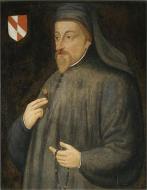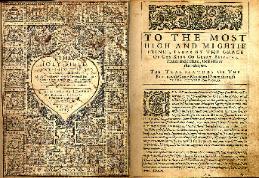
The English language had been brought to Britain by
the Germanic tribes—Angles, Saxons and Jutes. They
gave us their words for concrete things like sun, moon,
hand, foot, heat and cold.
When St. Augustine brought Christianity to the land in
597 A.D., Latin and Greek words were added.
Ecclesiastic words gave the words for abstractions and
foreign concepts like angel, disciple, psalm, lion, cedar,
orange and oyster.
The Viking raids of 750-105 brought Danish and
Norwegian words. When King Alfred overcame the
Vikings, he had English rather than Latin used in the
schools and instituted a record of current events, The
Anglo-Saxon Chronicles.
All these sources added variety and synonyms to the
language.
The Norman Invasion of 1066 brought French to
England. William the Conqueror was crowned in
Westminster Abbey, and French became the language
of society and culture; Latin, of religion and learning;
and English of common speech.
The English-speaking peasants in the fields thought in
terms of cows, sheep and pigs, while their French
overlords saw them as the beef, mutton and pork on
their tables. English not only survived, it was enriched
by each of these waves.
In 1325, the chronicler William of Nassyngton wrote:
Latin can no one speak, I trow,
But those who it from school do know;
And some know French, but no Latin
Who’re used to Court and dwell therein,
* * * * *
the Germanic tribes—Angles, Saxons and Jutes. They
gave us their words for concrete things like sun, moon,
hand, foot, heat and cold.
When St. Augustine brought Christianity to the land in
597 A.D., Latin and Greek words were added.
Ecclesiastic words gave the words for abstractions and
foreign concepts like angel, disciple, psalm, lion, cedar,
orange and oyster.
The Viking raids of 750-105 brought Danish and
Norwegian words. When King Alfred overcame the
Vikings, he had English rather than Latin used in the
schools and instituted a record of current events, The
Anglo-Saxon Chronicles.
All these sources added variety and synonyms to the
language.
The Norman Invasion of 1066 brought French to
England. William the Conqueror was crowned in
Westminster Abbey, and French became the language
of society and culture; Latin, of religion and learning;
and English of common speech.
The English-speaking peasants in the fields thought in
terms of cows, sheep and pigs, while their French
overlords saw them as the beef, mutton and pork on
their tables. English not only survived, it was enriched
by each of these waves.
In 1325, the chronicler William of Nassyngton wrote:
Latin can no one speak, I trow,
But those who it from school do know;
And some know French, but no Latin
Who’re used to Court and dwell therein,
* * * * *
But simple or learned, old or young,
All understand the English tongue.
The period we call Middle English, from 1150-1500, marked
the domination of London English and of the written
language. Geoffrey Chaucer's CanterburyTales marked the
rebirth of English as a national language.
His printer, William Caxton, and Henry V, the first king to use
English in official documents, helped strengthen the
language and prepare it for perhaps its greatest writer,
William Shakespeare, who wrote in the vernacular and
showed how expressive it could be.
It’s impossible to overestimate Shakespeare's importance to
the history of the English language. His vocabulary was
twice that of the average educated person today.
By 1600, nearly half the population was literate. Outside of
the universities, people preferred to read English rather than
Latin or Greek. King James I had his influential Bible, the
King James Version, translated into English.
Last Saturday, March 28, Frank, Kathy, Katyana and I went to
the Huntington in San Marino, where we saw several of these
classics of the English language.
The Huntington is a library, art collection and gardens on the
estate of Henry E. Huntington, railroad, utilities and real
estate magnate, who willed the core of his outstanding
collections of books, art and plants to a nonprofit educational
trust hosting over 500,000 visitors a year.
Other articles in this website include Standardization and
Spread, 3 Influential Writings and My English.
I'd love to hear your reactions to this and any other websites,
as well as your suggestions for future themes. Just write me
at b.silvey@sbcglobal.net.
All understand the English tongue.
The period we call Middle English, from 1150-1500, marked
the domination of London English and of the written
language. Geoffrey Chaucer's CanterburyTales marked the
rebirth of English as a national language.
His printer, William Caxton, and Henry V, the first king to use
English in official documents, helped strengthen the
language and prepare it for perhaps its greatest writer,
William Shakespeare, who wrote in the vernacular and
showed how expressive it could be.
It’s impossible to overestimate Shakespeare's importance to
the history of the English language. His vocabulary was
twice that of the average educated person today.
By 1600, nearly half the population was literate. Outside of
the universities, people preferred to read English rather than
Latin or Greek. King James I had his influential Bible, the
King James Version, translated into English.
Last Saturday, March 28, Frank, Kathy, Katyana and I went to
the Huntington in San Marino, where we saw several of these
classics of the English language.
The Huntington is a library, art collection and gardens on the
estate of Henry E. Huntington, railroad, utilities and real
estate magnate, who willed the core of his outstanding
collections of books, art and plants to a nonprofit educational
trust hosting over 500,000 visitors a year.
Other articles in this website include Standardization and
Spread, 3 Influential Writings and My English.
I'd love to hear your reactions to this and any other websites,
as well as your suggestions for future themes. Just write me
at b.silvey@sbcglobal.net.

| April 2015 |
| Billie Silvey |
An eclectic website about Women, Christianity, History, Culture and
the Arts--and anything else that comes to mind.
the Arts--and anything else that comes to mind.







The History of the
English Language
English Language

| Katyana in the Rose Garden at the Huntington |